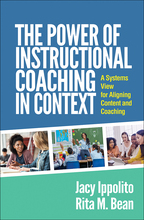The Power of Instructional Coaching in Context
A Systems View for Aligning Content and Coaching
Jacy Ippolito and Rita M. Bean
“This book provides valuable tools for instructional coaches, school and district leaders, teachers, and specialized literacy professionals, who all must work in concert to ensure coaching success. The authors’ authentic experience and wisdom led them to develop a unique coaching framework that focuses on defining and aligning the instructional core, coaching programs and processes, and contexts of effective coaching. As a former literacy coach who has supported thousands of coaches across multiple states, I heartily endorse this work for new or seasoned coaches or those charged with developing or supporting a coaching effort. The book's specific examples, realistic guidance, and reflective, carefully crafted questions will be of great benefit to anyone engaged in instructional coaching.”
—Kevin Smith, EdD, Senior Research Associate, Florida Center for Reading Research at Florida State University
“This user-friendly book is written in an engaging style and is organized to guide the reader through the chapters. The authors include authentic stories from coaches, as well as guiding questions and activities that course instructors can use with students. The book provides the full picture of what coaching looks like in a school system. I look forward to using this text in our new literacy coaching certificate program.”
—Bethanie Pletcher, EdD, Department of Curriculum, Instruction, and Learning Sciences, Texas A&M University–Corpus Christi
“Instructional coaching can look vastly different depending on school and district contexts. This book helps school and district leaders build a culture of collaboration in which coaching can thrive. The authors address the importance of considering adult learning and development, creating a coaching theory of action, fostering relationships among teachers and leaders, and so much more. Using research, theory, and their own experiences, Ippolito and Bean guide leaders to align the content and context of coaching to promote equitable outcomes for both teachers and students. The book will inspire current and future educational leaders to 'think big' with respect to coaching, in ways that are immediately applicable and will lead to long-term change.”
—Alexandra Shelton, PhD, School of Education, Johns Hopkins University
“Using a systems perspective, Ippolito and Bean describe fundamental considerations for improving coaching in schools. The authors offer applicable insights to strengthen programs and practices. They highlight the importance of context—the conditions shaping coaches’ work and educators’ responses to coaching. This book encourages educational leaders to move beyond one-size-fits-all coaching models, and invites researchers to further explore coaching dynamics.”
—Sarah L. Woulfin, PhD, Department of Educational Leadership and Policy, University of Texas at Austin
Table of Contents
I. Introduction
1. Content and Context Matter: Coaching Doesn’t Happen in a Vacuum 
2. Seeing the Systems at Work in Schools: The First Step to Building and Sustaining a Culture of Coaching
II. The Content of Coaching
3. The Instructional Core: Identifying the What and Why of Coaching
4. Supporting the Implementation and Sustainability of the Instructional Core
III. Coaching Programs and Processes
5. Designing a Coaching Program That Works for Your School and District
6. Defining Roles and Responsibilities to Support Coaching Programs and Processes
7. Differentiating Coaching Moves to Support Coaching Programs and Processes
IV. The Context of Coaching
8. Stepping Back to See the Bigger Picture
9. District, School, and Community Levers to Support the Context of Coaching
10. Sustaining a Healthy System for Coaching: The Need for Support and Pressure
11. A Final Note: Why the Content and Coaching in Context Framework Matters for Coaches and Schools
Appendices
References
Index
About the Authors
Jacy Ippolito, EdD, is Professor in the McKeown School of Education at Salem State University in Massachusetts, where he teaches courses in literacy and leadership, codirects graduate programs in Educational Leadership, and is the cofounder and coleader of the Center for Educational Leadership. Prior to joining Salem State, Dr. Ippolito was a middle school reading specialist, drama teacher, and literacy coach. His research, teaching, and consulting focus on the intersection of coaching, leadership, adolescent/disciplinary literacy, and school reform. He is the author of numerous journal articles and books.Rita M. Bean, PhD, is Professor Emerita in the School of Education at the University of Pittsburgh. Prior to joining the university, she taught at the elementary school level and served as a reading supervisor for grades K–12. Dr. Bean has published numerous articles, book chapters, and books on topics including professional learning and the role of reading specialists and literacy coaches. She is a member of the Reading Hall of Fame and a former board member of the International Literacy Association. Dr. Bean is a recipient of the University of Pittsburgh’s Chancellor’s Distinguished Teaching Award and Distinguished Service Award, among other honors.
